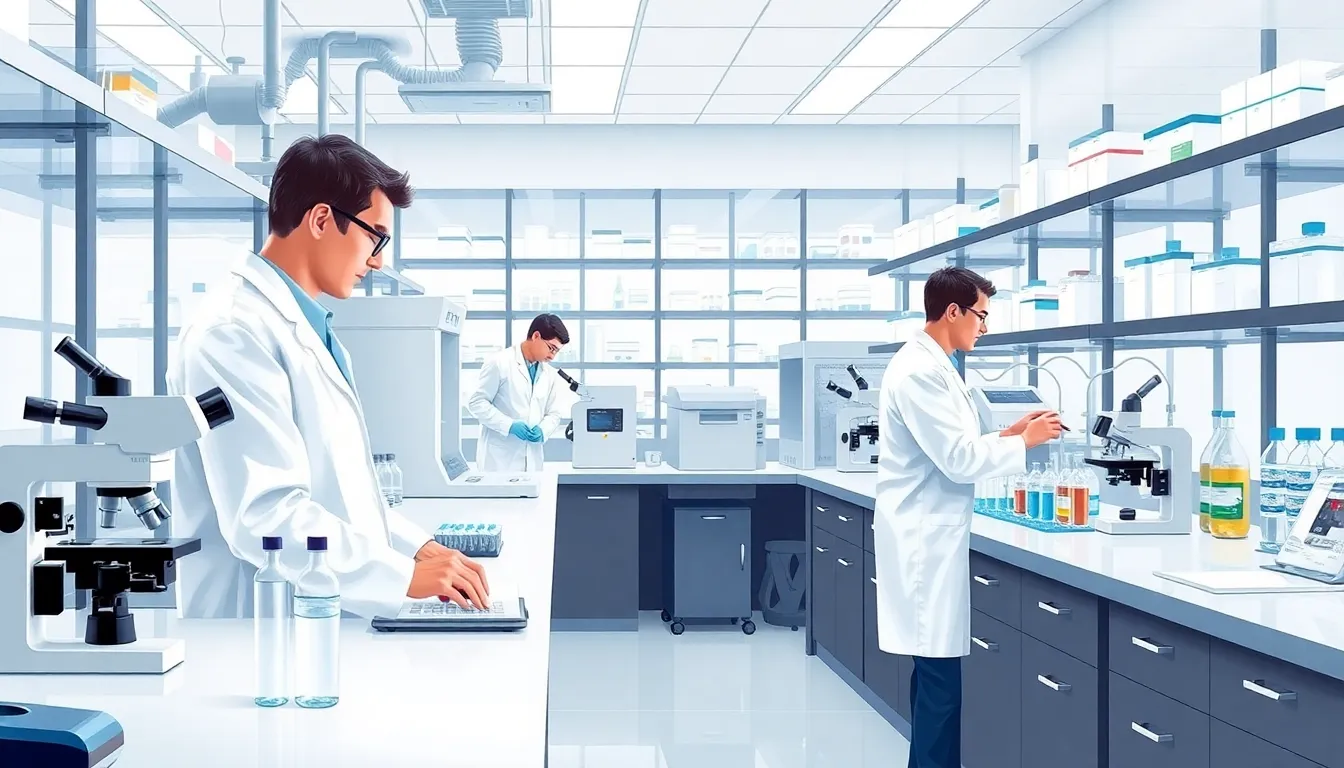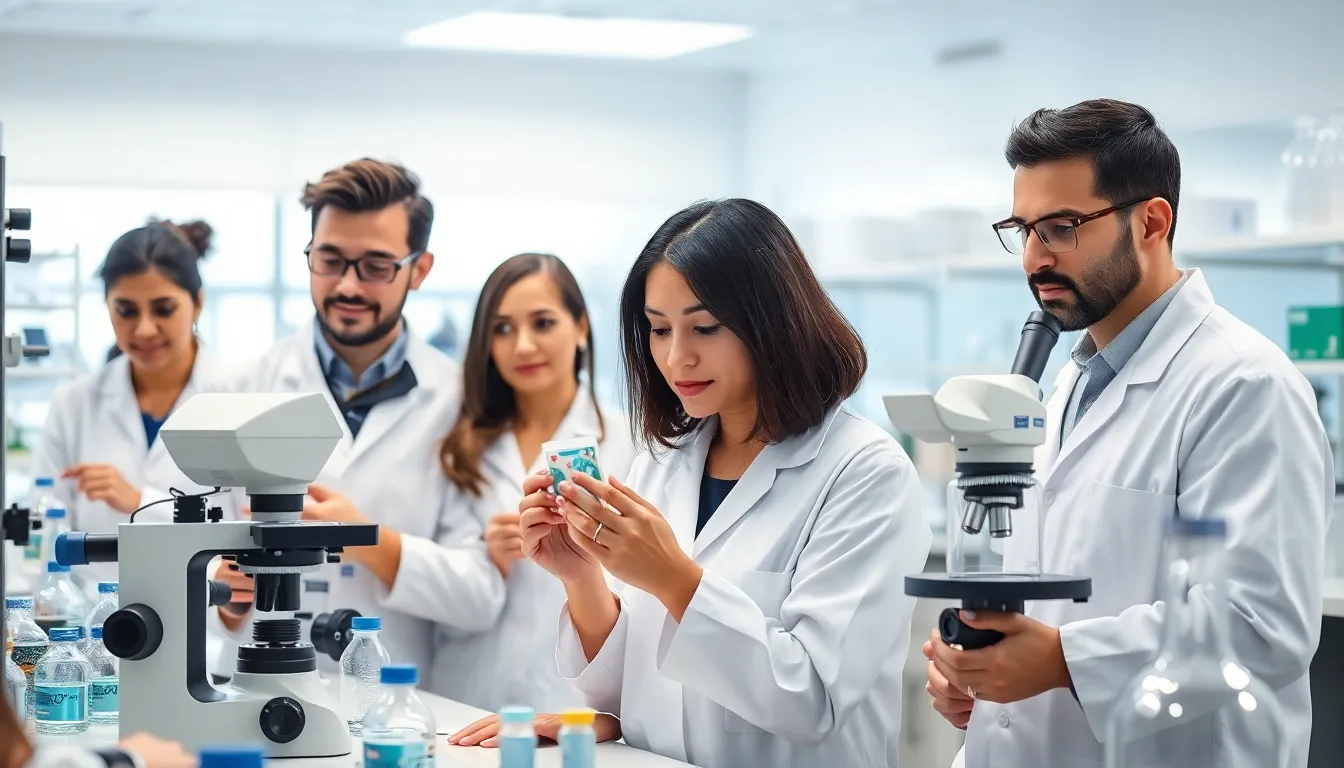Table of Contents
ToggleIn a world where science fiction is quickly becoming science fact, biotech labs are leading the charge. These innovative spaces are where the magic happens—turning wild ideas into groundbreaking solutions. Imagine a place buzzing with scientists in lab coats, mixing potions that could cure diseases, enhance crops, or even create the next big thing in sustainable energy. It’s like a superhero headquarters, but instead of capes, they wear goggles.
Overview of Biotech Labs
Biotech labs serve as hubs for scientific research and development, focusing on the application of biological processes in various sectors. These facilities utilize cutting-edge technology to conduct experiments related to health, agriculture, and environmental sustainability. They usually house specialized equipment, such as sequencers, incubators, and centrifuges, to facilitate advanced research.
One significant aspect of biotech labs is their emphasis on collaboration. Scientists often work alongside engineers and business experts to push boundaries and foster innovation. Researchers integrate genetic engineering and bioinformatics to uncover solutions for pressing challenges, such as disease outbreaks and food security issues.
Regulatory compliance plays a crucial role in the operation of biotech labs. These laboratories must adhere to strict guidelines set by organizations like the Food and Drug Administration (FDA) and the Environmental Protection Agency (EPA). Following these regulations ensures that research outcomes maintain safety and efficacy standards.
Additionally, biotech labs contribute to academic and corporate partnerships. Universities frequently collaborate with biotech firms, providing access to new research findings and fostering talent development. Such partnerships enhance the knowledge base, allowing both entities to leverage resources effectively.
The global biotech lab market is expanding rapidly, with expected growth driven by advancements in personalized medicine and biomanufacturing. As these labs continue to evolve, they will play an increasingly important role in addressing global challenges, impacting the lives of millions.
Types of Biotech Labs

Biotech labs encompass various types, each focusing on different aspects of biological research and development. Understanding these categories provides insight into their specific functions within the field.
Research Laboratories
Research laboratories emphasize experimentation and discovery. These labs typically engage in fundamental research to understand biological processes. Scientists utilize advanced techniques like CRISPR and genome sequencing in these environments. Insights gained often contribute to therapeutic advancements and biotechnology innovations. Collaborative projects frequently happen here, involving various disciplines, enhancing results and fostering creativity.
Clinical Laboratories
Clinical laboratories focus on diagnosing and treating diseases. Through testing biological samples, they provide critical information for patient care. Techniques often include microbiology, molecular diagnostics, and immunology. Regulatory compliance is essential, ensuring accurate and reliable results. These labs work closely with healthcare professionals. Professional collaboration ensures the successful application of findings to improve patient outcomes.
Production Facilities
Production facilities play a vital role in manufacturing biotechnological products. These labs are responsible for scaling up the production of biologics, vaccines, and therapeutic proteins. Strict adherence to Good Manufacturing Practices (GMP) guarantees product safety and quality. Engineers and technicians often collaborate to optimize processes and increase efficiency. These facilities are essential for meeting global demand for biopharmaceuticals and contribute significantly to public health initiatives.
Technologies Used in Biotech Labs
Biotech labs utilize a range of technologies that drive research and innovation in the field. Key technologies such as genetic engineering and bioinformatics play a vital role in advancing scientific discovery.
Genetic Engineering
Genetic engineering comprises techniques that modify the genetic makeup of organisms. CRISPR and recombinant DNA technology enable precise alterations, facilitating breakthroughs in medicine and agriculture. Researchers apply these methods to create genetically modified organisms with desirable traits, such as disease resistance. Innovations in gene therapy offer potential treatments for genetic disorders, promising significant health advancements. Furthermore, the ability to edit genomes paves the way for new approaches in personalized medicine, tailoring treatments to individual patients.
Bioinformatics
Bioinformatics combines biology, computer science, and information technology to analyze complex biological data. This discipline enhances the understanding of genomic sequences and biological processes, facilitating significant discoveries. Researchers rely on bioinformatics tools to manage large datasets generated from genomic studies, protein structures, and metabolic pathways. Moreover, the integration of artificial intelligence in bioinformatics amplifies predictive modeling in drug discovery and development. As this field evolves, bioinformatics continues to provide insights that drive innovations across biotechnology, enhancing research efficiency and accuracy.
Importance of Biotech Labs
Biotech labs significantly impact various sectors, primarily through their advancements in medicine and environmental sustainability. These facilities create solutions that address urgent global issues.
Advancements in Medicine
Biotech labs drive innovations in medicine by focusing on personalized treatments. Researchers utilize genetic engineering techniques, such as CRISPR, to target specific genes associated with diseases. Breakthroughs in gene therapy result from these experiments, leading to potential cures for conditions like cancer and genetic disorders. Additionally, labs develop biopharmaceuticals that provide effective treatments and enhance patient outcomes. Clinical trials conducted within these environments ensure safety and efficacy, allowing for timely administration of new therapies. Overall, biotech labs play a pivotal role in revolutionizing healthcare solutions.
Environmental Impact
Biotech labs contribute significantly to environmental sustainability through innovative approaches. Techniques in genetic engineering help create crops resistant to pests and diseases, thereby reducing the need for chemical pesticides. This reduction supports healthier ecosystems and promotes agricultural efficiency. Additionally, labs engage in bioremediation, where microorganisms are used to clean up contaminated environments. They also advance biofuels production, offering renewable energy alternatives that decrease reliance on fossil fuels. By fostering sustainable practices, biotech labs address environmental challenges while enhancing food security and conservation efforts.
Challenges Faced by Biotech Labs
Biotech labs encounter various challenges that can hinder their innovation and progress. Two significant issues include funding and resource allocation, as well as regulatory hurdles.
Funding and Resource Allocation
Funding presents a critical challenge for many biotech labs. Securing financial investment often depends on the lab’s ability to demonstrate the potential for groundbreaking discoveries. Venture capitalists and government grants play vital roles in supporting research projects. Limited budgets can restrict the scope of experiments and slow the pace of innovation. Resource allocation also impacts the efficiency of operations. A lab’s capability to invest in advanced technology relies on effective management of available funds. Proper resource allocation fosters collaboration among researchers, ensuring that each project receives the necessary attention and support.
Regulatory Hurdles
Regulatory hurdles significantly impact biotech labs’ operations. Compliance with guidelines set by organizations like the FDA and EPA is mandatory for all research and production activities. Navigating the complex regulatory landscape can slow down project timelines due to extensive reviews and approvals. Laboratories often struggle to maintain compliance while striving for innovation. These challenges create frustration among researchers. However, establishing robust quality assurance processes helps mitigate risks associated with non-compliance. Adapting to evolving regulations ensures labs remain competitive and contribute positively to the biotechnology field.
Biotech labs are at the forefront of innovation shaping the future of medicine agriculture and environmental sustainability. Their dynamic environments foster collaboration among scientists engineers and business experts driving breakthroughs that address some of the world’s most pressing challenges.
As these labs continue to evolve with advancements in technology and regulatory frameworks they enhance their ability to deliver impactful solutions. The ongoing expansion of the biotech lab market signifies a growing recognition of their importance in improving health outcomes and promoting sustainable practices.
Ultimately the work conducted in biotech labs holds the promise of transforming lives and creating a better future for generations to come.



